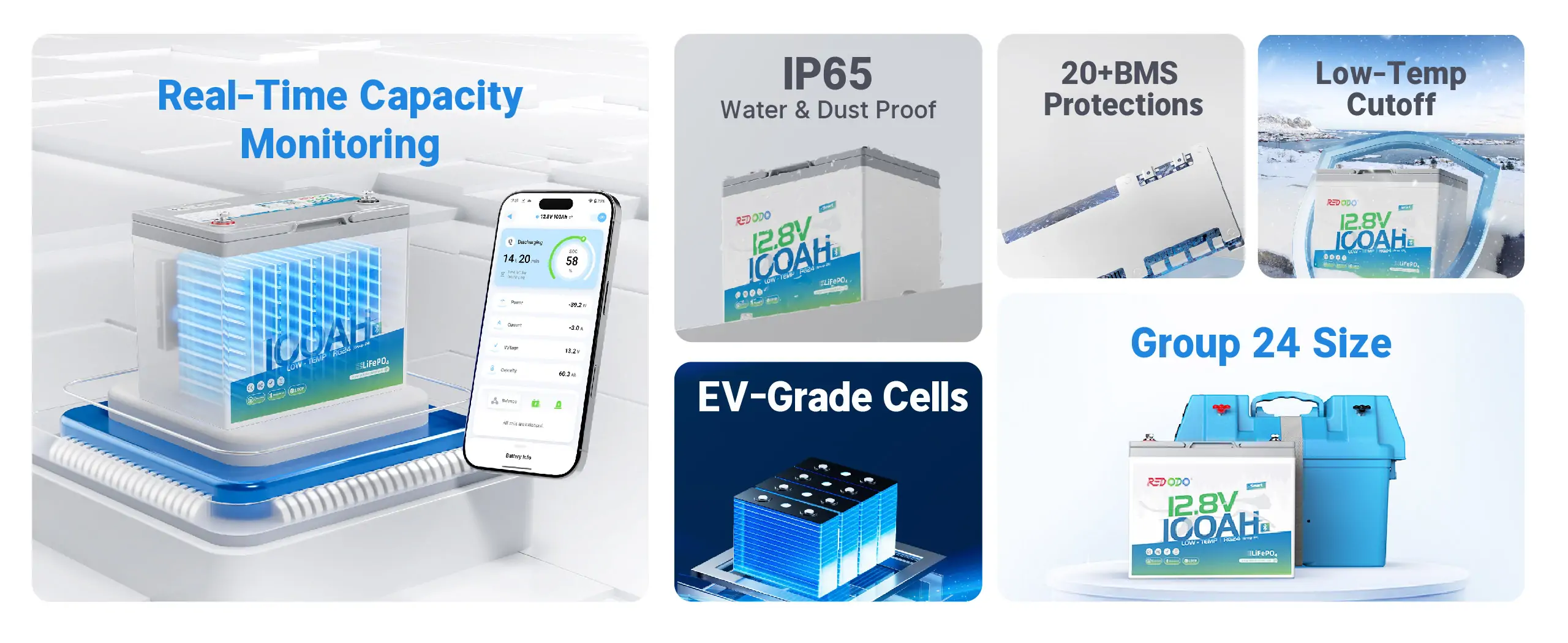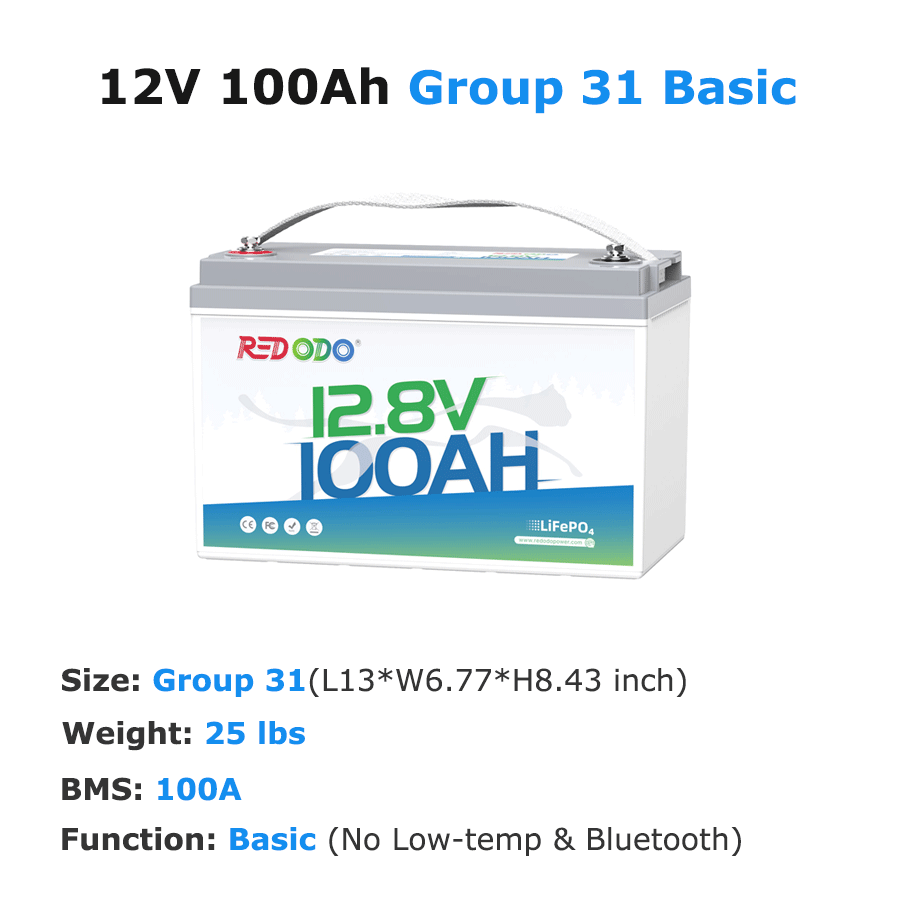Should You Run a Marine Radio on a Deep Cycle Battery?
A marine radio is one of the most critical communication tools on your boat. Whether you're fishing offshore, cruising coastal waters, or navigating inland lakes, staying in touch with nearby vessels, marinas, and emergency services is essential for both safety and convenience.
But the question is, should you run a marine radio on a deep cycle battery? The answer is yes. In this article, we’ll explore why, and how to maintain your marine battery for long-lasting performance.
Table of Content
- Why Your Marine Radio Deserves the Right Power Source?
- What Marine Battery Should You Use for Marine Radio?
- Are Marine Batteries Deep-Cycle Batteries?
- What Kind of Deep Cycle Battery are Best for Marine Radio?
- Run Your Marine Radio on Redodo LiFePO4 Deep Cycle Battery
- Charging & Maintenance Tips for Marine Batteries
- FAQs about Marine Batteries
Why Your Marine Radio Deserves the Right Power Source?
Your marine radio is one of the most essential pieces of safety and communication gear on your boat. Whether you’re coordinating with fellow boaters, tuning into NOAA weather updates, or reaching out to the Coast Guard during an emergency, that radio needs to be 100% reliable.
But a marine radio is only as reliable as the power source behind it. That’s why choosing the right battery is so critical. A weak or inappropriate battery could result in static, reduced transmission range, or even complete power loss when you need it most.
To ensure consistent performance, your battery must deliver a stable voltage over long periods and withstand the demanding marine environment. Additionally, to ensure sufficient power, it’s recommended to equip your marine radio with a dedicated battery.

What Marine Battery Should You Use for Marine Radio?
Marine radios require a reliable and consistent power source, so the deep cycle marine batteries are the best match for powering. The batteries can also power marine electronics like trolling motors, fish finders, navigation systems, and onboard lights.
Unlike the marine starting batteries for starting an engine, which requires a short, powerful burst of energy, a marine radio draws a small, steady current over a long period. There is why you need a deep cycle battery for deep discharging and long-duration using.
Key Requirements for a Marine Radio Battery:
- Stable voltage output for uninterrupted operation
- Deep discharge capability to run electronics longer
- Low self-discharge rate during periods of inactivity
- Resistant to vibration and harsh marine environments
Are Marine Batteries Deep-Cycle Batteries?
Not all marine batteries are deep-cycle batteries, but many are. Marine batteries generally fall into three categories: starting (cranking) batteries, deep cycle batteries, and dual-purpose batteries.
- Starting batteries are designed to deliver a quick burst of power to start your boat’s engine.
- Deep cycle batteries are built to provide steady power over a longer period, making them ideal for running electronics like marine radios, fish finders, and lights.
- Dual-purpose batteries combine the functions of starting and deep-cycle batteries, offering both high cranking power and moderate deep cycling capability.
For running a marine radio, a deep cycle battery is preferred because it can handle long, consistent power draw without being damaged by deep discharges.
What Kind of Deep Cycle Battery are Best for Marine Radio?
There are three main types of marine deep cycle batteries: Flooded lead-acid, AGM, and LiFePO4 lithium.
- Traditional flooded lead-acid batteries are inexpensive but require maintenance and venting.
- AGM (absorbed glass mat) batteries offer better durability and are maintenance-free, but they are still heavy and prone to shorter cycle life.
- LiFePO4 (Lithium Iron Phosphate) batteries are lightweight, long-lasting, safe, and virtually maintenance-free, making them best for marine applications.
Another major advantage of lithium deep cycle batteries is their resistance to deep discharges. While lead-acid and AGM batteries should generally only be discharged to 50% (at 1C) to preserve lifespan, lithium deep cycle batteries can handle up to 100% depth of discharge. That means more usable power and longer runtime per charge. However, to extend the battery life, it’s advisable to avoid frequently discharging over 80% of level.
Run Your Marine Radio on Redodo LiFePO4 Deep Cycle Battery
If you're looking for a dependable and advanced power solution for your marine radio, Redodo LiFePO4 deep cycle batteries are a smart choice. Here’s why:
Marine-Ready Durability
Redodo batteries are built with IP65 waterproof and corrosion-resistant housing, protecting them from salt spray, moisture, and vibration, which are common challenges in marine environments.
Longer Lifespan
Redodo batteries are built with EV-grade LiFePO4 cells, delivering an impressive 4,000-15,000 charge cycles and a lifespan of up to 10 years. That's 3 times longer than traditional lead-acid batteries.
Stable Voltage & Output
Redodo lithium batteries maintain a stable voltage and output, ensuring consistent power for sensitive electronics like marine radios, fish finders, ham radios, and GPS units.
Built-in Advanced BMS
Each Redodo battery includes an advanced BMS (Battery Management System) that offers protection from overcharging, over-discharging, overcurrent, short circuits, and low/high temperatures, making it safer and smarter.
Lightweight and Compact Design
Redodo’s lithium batteries are about 2/3 lighter than their lead-acid counterparts. That weight reduction is valuable on smaller boats or kayaks with limited space.
Top Redodo Marine Deep Cycle Battery Options
Redodo 12V 100Ah Lithium Trolling Motor Battery – Ideal for powering marine radios, trolling motors, fish finders, and lights, with low-temperature cutoff protection.
Redodo 12V 100Ah Group 24 Bluetooth Battery – Compact Group 24 size, smart Bluetooth can easily track battery status and manage shutoff.
Redodo 12V 100Ah Mini Lithium Battery – A lightweight option for smaller vessels and low-power marine devices. 35% smaller than standard 12V 100Ah model while keeping the same energy output!
Check out Redodo 12V 100Ah series to find the best battery for your marine radio and other marine electronics.
Charging & Maintenance Tips for Marine Batteries
Proper charging and maintenance can maximize the life and performance of your deep cycle battery, especially in marine use.
Use a Compatible Charger
For Redodo LiFePO4 batteries, always use a LiFePO4 battery charger. These chargers provide the correct voltage profile and automatic cutoff to prevent overcharging. Look for models of 14.6V charging voltage for 12V lithium batteries, and 29.2V charger for 24V lithium batteries. Avoid using lead-acid battery chargers for these LiFePO4 lithium batteries.
Match Charger Output to Battery Capacity
Choose a charger with an appropriate amp rating. A good rule of thumb is a charging current of 0.2C, where C is the battery’s capacity. For example, a 12V 100Ah Redodo battery is best charged with a 14.6V 20A charger. Charging below 0.2C is safe but will take longer, above 0.5C may stress the battery unless it's rated for fast charging.
Installation Battery in Secure Placement
When installing a marine battery, always choose a stable, well-ventilated, and accessible location. The battery should be mounted in a battery box or secured with straps to prevent movement caused by wave impacts or boat vibration. Keep the battery compartment clean and free of debris, salt buildup, or standing water.

Manage Your Marine Batteries
It’s also a good practice to label the battery (e.g., "Radio Only") if you're running a dedicated power source for your marine electronics. This helps you quickly identify and manage loads during use or troubleshooting.
If you're using multiple batteries (e.g., starting and deep cycle batteries), isolate circuits with a marine-grade battery switch. This prevents cross-draining and ensures each battery performs its dedicated role.
FAQs about Marine Batteries
What’s the difference between trolling motor batteries and marine deep cycle batteries?
Trolling motor batteries are a type of deep cycle battery specifically designed to handle high amp draw over extended periods. They typically come in higher capacities (e.g., 100Ah or more) to power trolling motors for hours, while deep cycle marine batteries don’t always require as much capacity.
In essence, all trolling motor batteries are deep cycle batteries, but not all marine deep-cycle batteries are suited for trolling motors.
What size of lithium battery for marine radio?
For a dedicated marine radio, a 12V lithium battery in the range of 50Ah to 100Ah is typically sufficient. Marine radios draw relatively low power, so a smaller-capacity lithium battery can keep it running for several hours or even days, depending on usage.
If you're powering additional electronics like GPS and fish finders along with the radio, consider a larger capacity battery like Redodo 12V 165Ah model to ensure ample runtime and reserve power.
Can I use a starting battery for my marine radio?
No. Starting batteries are meant for short bursts and can damage the marine radio if used for continuous use. Deep cycle batteries are appropriate for marine electronics.
How long will a 12V 100Ah battery run my marine radio?
If your marine radio draws around 25 watts, a 12V 100Ah battery could theoretically run it for 48 hours. Actual runtime will vary depending on usage, battery age, and temperature.
Can I run my marine radio and fish finder on the same battery?
Yes. Just make sure the battery has enough capacity (Ah rating) to support both devices for the desired duration.

Redodo

Redodo
Join Redodo
Related Post

36V vs. 48V Battery for Golf Cart: Which Is Better?

How To Prepare for Power Outage in Winter? A Full Guide

15 Best Black Friday Deep Cycle Battery Deals 2025

17 Top Black Friday Battery Deals for RV, Marine, and Solar Use












